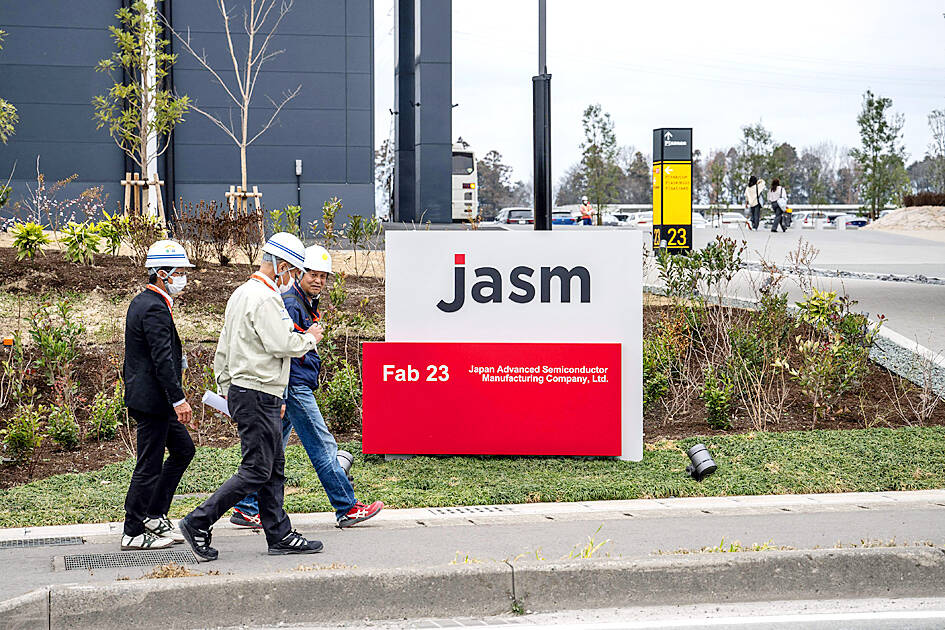Taiwan Semiconductor Manufacturing’s (TSMC, 台積電) first wafer fab in Kumamoto, Japan is still set to launch commercial production in the fourth quarter of this year as planned, the world’s largest contract chipmaker said on Saturday in response to reports that mass production might begin ahead of schedule.
TSMC said the monthly production capacity of the joint venture fab, Japan Advanced Semiconductor Manufacturing (JASM), is expected to hit 55,000 units of 12-inch wafers, using the mature 12-nanometer, 16-nanometer, 22-nanometer and 28-nanometer processes.
JASM is owned by TSMC and its Japanese business partners Sony Semiconductor Solutions Corp and Denso Corp, with the Taiwanese company holding the majority of shares.

Photo: Philip FONG, AFP
TSMC’s remarks came after a local media report said earlier in the day that because Sony is a major CMOS image sensor supplier to Apple Inc, the US consumer electronics giant had been repeatedly urging JASM to mass produce chips ahead of schedule.
The report said the fab began a trial run before the Lunar New Year holiday after it began installing equipment in October 2022. It has been rolling out about 3,000 chips per month and commercial production was expected to start ahead of schedule, the report added.
TSMC founder Morris Chang (張忠謀), Japanese Prime Minister Fumio Kishida and Japan’s Princess Kako are expected to attend the opening ceremony of the Kumamoto fab on Saturday, the report said.
Investment in the fab totaled about ¥1.1 trillion (US$7.32 billion), and the subsidies provided by the Japanese government accounted for almost half of the investment amount, it said.

CHIP WAR: Tariffs on Taiwanese chips would prompt companies to move their factories, but not necessarily to the US, unleashing a ‘global cross-sector tariff war’ US President Donald Trump would “shoot himself in the foot” if he follows through on his recent pledge to impose higher tariffs on Taiwanese and other foreign semiconductors entering the US, analysts said. Trump’s plans to raise tariffs on chips manufactured in Taiwan to as high as 100 percent would backfire, macroeconomist Henry Wu (吳嘉隆) said. He would “shoot himself in the foot,” Wu said on Saturday, as such economic measures would lead Taiwanese chip suppliers to pass on additional costs to their US clients and consumers, and ultimately cause another wave of inflation. Trump has claimed that Taiwan took up to

A start-up in Mexico is trying to help get a handle on one coastal city’s plastic waste problem by converting it into gasoline, diesel and other fuels. With less than 10 percent of the world’s plastics being recycled, Petgas’ idea is that rather than letting discarded plastic become waste, it can become productive again as fuel. Petgas developed a machine in the port city of Boca del Rio that uses pyrolysis, a thermodynamic process that heats plastics in the absence of oxygen, breaking it down to produce gasoline, diesel, kerosene, paraffin and coke. Petgas chief technology officer Carlos Parraguirre Diaz said that in

SUPPORT: The government said it would help firms deal with supply disruptions, after Trump signed orders imposing tariffs of 25 percent on imports from Canada and Mexico The government pledged to help companies with operations in Mexico, such as iPhone assembler Hon Hai Precision Industry Co (鴻海精密), also known as Foxconn Technology Group (富士康科技集團), shift production lines and investment if needed to deal with higher US tariffs. The Ministry of Economic Affairs yesterday announced measures to help local firms cope with the US tariff increases on Canada, Mexico, China and other potential areas. The ministry said that it would establish an investment and trade service center in the US to help Taiwanese firms assess the investment environment in different US states, plan supply chain relocation strategies and

Japan intends to closely monitor the impact on its currency of US President Donald Trump’s new tariffs and is worried about the international fallout from the trade imposts, Japanese Minister of Finance Katsunobu Kato said. “We need to carefully see how the exchange rate and other factors will be affected and what form US monetary policy will take in the future,” Kato said yesterday in an interview with Fuji Television. Japan is very concerned about how the tariffs might impact the global economy, he added. Kato spoke as nations and firms brace for potential repercussions after Trump unleashed the first salvo of